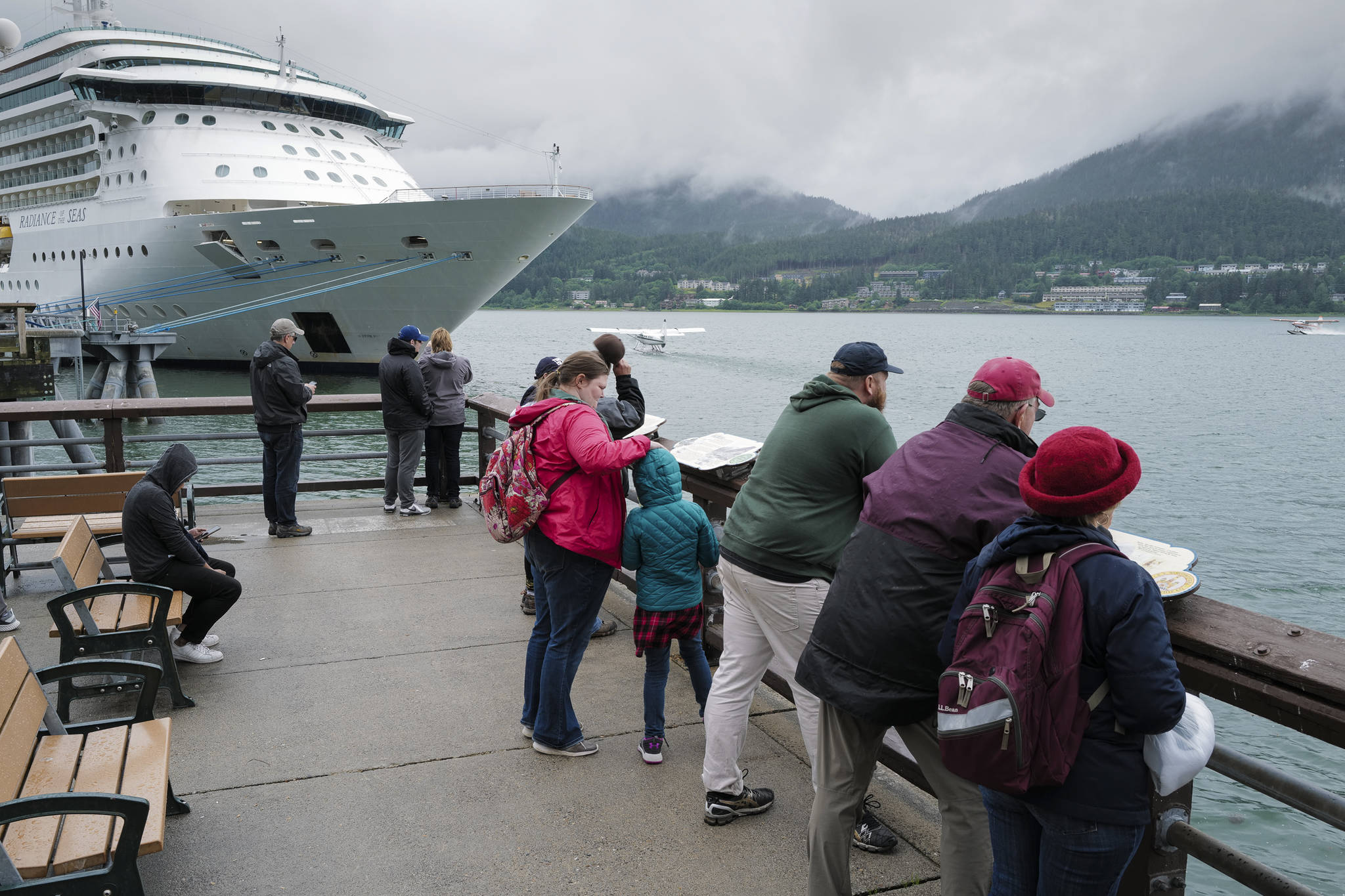Cruise ship tourism is expected to grow again next year.
A 4- to 5- percent increase over this year’s 1.3 million tourists is anticipated in 2019, said Kirby Day, Juneau’s Tourism Best Management Practices coordinator and operations manager for Holland America Group including Princess Cruises, during a chamber of commerce luncheon.
This year, a 16.5-percent increase is expected over 2018 once the dust settles, Day said. So far, there’s been about a 12.5 percent year-over-year bump. A 5 percent increase over 1.3 million would mean 65,000 more people visiting Juneau.
“It’s still a decent number, but I think we’re over that big growth spurt this year, which is good,” Day said. “Because if we got through it by handling a lot of the concerns, then we can really over the course of the winter, this organization and tour operators can fine tune some of the things we didn’t get to.”
Day said after his joint presentation with Travel Juneau CEO and President Liz Perry that slowed growth is likely the result of a combination of infrastructure limitations, market demands and the reality that 17 percent year-over-year growth can’t occur every year.
“If you’re going to grow 16 percent in one year, it’s logical you’re going to have a year or two of flattening out and filling that space,” Day said.
[Neighborhoods share their crowding concerns]
Another arrival next year, Perry said, could be tourism pledges.
Responsible tourism pledges aren’t enforceable by law, Perry said, but they do plant the idea of being a conscientious visitor in the mind of people descending upon a destination. Iceland has such a pledge and so does the island nation Palau.
“It’s something we want to do in the fairly near future,” Perry said.
The glimpse into what to expect next year was a small portion of Perry and Day’s presentation, which primarily focused on Tourism Best Management Practices, which is a cooperative effort by tourism-related businesses and the City and Borough of Juneau and sets voluntary industry guidelines.
The program started in the mid ’90s. Day said at the time of its inception, there were about 20 guidelines and now there are approximately 90 guidelines meant to minimize the impact of the tourism industry on life in Juneau.
Day said at the time the program began, residents were concerned that 500,000 annual visitors were too many. He said TBPM is a big reason Juneau has been able to accommodate an annual tourist total that’s swelled by almost 1 million people since then, but he said it’s likely time to take another hard look at how tourism impacts locals.
“It’s time again to look at the growth that we’ve experienced,” Day added. “We recognize the challenges.”
He said off-season discussions about limitations on the number of people or boats coming to Juneau are expected.
“We’re not afraid to talk about that,” Day said of the industry, “and how you get to that number and whether it’s a number or how you manage that number.”
While the tourist season is ongoing, Day and Perry heavily encouraged people in the room to call the TBMP hotline to report tourism-related complaints, such as a bus where it shouldn’t be. The hotline number is 586-6774.
Perry, who administers the hotline for TBMP, said through the end of July the hotline had received 73 calls, which is slightly up from last year.
“We take those very, very seriously,” Perry said of complaints filed with TBMP.
She said while calls about visible cruise ship emissions are down this year — no calls have come in regarding them within the past six to eight weeks —calls about whale watch operations and helicopter noise are up. She did not cite specific figures for those two categories of incident.
[Air emission complaints are down this year ]
When a call comes in, Perry said TBMP reaches out to the operator via email. The operator then has three business days to respond to the email to explain the report or a follow-up email is sent. If an operator is not identified, Perry said an email is sent to all operators who run a business that fits the complaint.
“That keeps people on their toes, because that lets operators know people are watching,” Perry said. “That keeps people on the up and up.”
Day said typically most operators are responsive to the emails, but if there’s repeated noncompliance with guidelines there can be repercussions.
“We did have two letters go out to operators this summer about activities went out from the CBJ from Harbors, and they need a permit to operate on the water front and pickup on the water front, and if they don’t follow the guidelines to some specificity, they could pull their permits,” Day said.
He said TBMP is not a “silver bullet” and hasn’t fixed every tourism-related problem, but it is a considerable improvement over no system and encourages tourism industry professionals to do better.
“We can all do better,” Day said. “We can always work to do better.”
• Contact reporter Ben Hohenstatt at (907)523-2243 or bhohenstatt@juneauempire.com. Follow him on Twitter at @BenHohenstatt.

